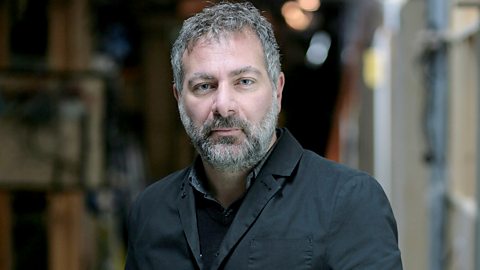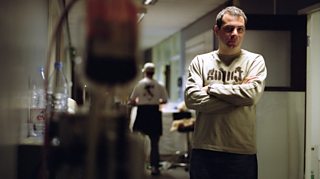Jed Mercurio: Nine things we learned from his This Cultural Life interview
Jed Mercurio is one of the defining television writers of the modern age. He made his name working on the medical dramas Cardiac Arrest and Bodies, but his biggest hit came with the long-running police drama Line of Duty. The series 6 finale was watched by over 16 million viewers.
In this episode of This Cultural Life, Mercurio tells John Wilson about how he started writing by accident, the real-life tragedy that inspired Line of Duty, and why he thinks he might be more suited to fixing space stations.
Here are nine things we learned.

"We do deal with things the police really have done"
Jed Mercurio on writing Line of Duty.
1. Xenophobia changed Jed’s childhood
Mercurio grew up in Cannock, Staffordshire, the son of Italian immigrants. Mercurio never learned Italian because his brother was so poorly treated at school for speaking it. “There was a very negative reaction [at school] to him having Italian,” he says. “Because he was very little, he got confused between English and Italian and the school were very critical of that. So my parents really felt a need to assimilate and that we needed to appear to be British… They stopped speaking Italian in the house and I didn’t have that bilingual upbringing.” He says his parents were very proud of Italy but were too worried to let him embrace it. “It was a point of conflict, actually… It became a situation where they encouraged us to identify as British. Looking back, I can see that must have been painful for them.”
2. He never had ambitions to become a writer
Becoming a screenwriter, or a writer of any sort, never occurred to Mercurio as a child. He remembers his school firmly encouraged him to get an apprenticeship in a hardware shop. Anything creative was not really acknowledged. “There was very little input in terms of creative studies. Certainly, the idea of going on to a creative career, it wasn’t on the horizon.” Instead, his focus was on science, where he excelled. “I was very science-y, did well, went to medical school. That felt to me like the optimum route forward.”
3. He was in the RAF before becoming a writer
Mercurio’s medical qualification led him to the RAF, where he became a medical officer pilot. “When I found out there were opportunities to combine flying with medical research, it sounded like the ideal job to me,” he says. He loved flying and sometimes got a little reckless with it. “It’s not quite on the level of flying an F-14 below the hard deck in Top Gun, but you push the boundaries once you’ve developed enough experience with the aeroplane and you’re flying solo… Obviously you just kept it from the bosses.”

Still from Line of Duty: Series 6, Episode 7
4. Writing Cardiac Arrest was not his idea
Mercurio left the RAF for two reasons. One was that the Cold War ended and there were defence cutbacks. The other was that he accidentally moved into TV. In 1992, he responded to an advert asking for doctors who could serve as consultants on a new TV show. He went for an interview and told an executive about what it was like to be a doctor, trying to cope with understaffing and working with minimal supervision. “I thought I was just venting,” he says, but the producers saw the possibility of a TV show that portrayed medicine as it actually is. “They came back to me and asked me whether I could submit some story ideas… They liked them and wondered if I’d have a crack at writing a script… about a fictional doctor’s first day on the wards, where everything that can go wrong does go wrong.” That became Cardiac Arrest, which launched his TV career.

5. He’s a Star Trek fan
Mercurio professes a love for Star Trek, but it was not something that influenced his writing. In fact, it was the sort of structure he was trying to avoid. “It’s a different adventure every week,” he says, and what he was interested in were stories that developed over many episodes, many series, rewarding viewers for paying attention. “Some of the stuff that happened in Star Trek, you’d think they’d be talking about it for weeks, but on the next mission it seemed completely forgotten that Spock apparently killed Kirk in a fight to the death last week!”
6. Hill Street Blues is his biggest influence
Mercurio cites the American police drama Hill Street Blues as a major influence. “I think what I absorbed from Hill Street Blues was that you could knowingly be revisionist of the formula,” he says. “You could give the audience a certain set of expectations and then subvert them quite quickly. That would make some of the audience sit up and pay attention.” During the interview, Mercurio suddenly realises that he may have been more influenced by Hill Street Blues than he thought. At the end of the show’s first episode, the two main characters are shot, with the distinct suggestion they may be dead (they weren’t). This kind of rug-pulling plot twist became a staple of Line Of Duty. “Some of those influences are subconscious now, they’re buried. It’s only… when I start externalising them that I start to understand certain things.”
7. The killing of Jean Charles de Menezes inspired Line Of Duty
Mercurio was not planning to write a police drama, because he didn’t know anything about that world. That changed when he followed the case of the killing of Jean Charles de Menezes. In 2005, de Menezes was wrongly identified as one of a group of men who’d attempted a bombing on the London Underground. He was fatally shot by police at Stockwell Station. A subsequent investigation found significant failings on the part of the police. “What was interesting to me about that tragedy was not only that the mistake occurred, but what followed was an institutionalised effort to cover up the truth,” says Mercurio. “It brought home to me that there might be an opportunity to explore policing in the same way I explored medicine in Bodies, to go for something that looks at how an institution deals with its errors and sometimes its wrongdoing.” That thought led to Line of Duty.
It was a hard sell... It wasn’t the drama of reassurance that the hard-working, diligent cops catch the bad guys at the end and bang them up.Jed Mercurio on Line of Duty
8. Line Of Duty was not an immediate hit
It’s one of the biggest British TV shows of recent times, so it’s easy to forget that Line Of Duty was not always a mainstream smash. “It was a hard sell,” says Mercurio, “because it wasn’t a formulaic police drama about the police succeeding every week. It wasn’t the drama of reassurance that the hard-working, diligent cops catch the bad guys at the end and bang them up.” It took three series for the show to become a major hit and get moved from Βι¶ΉΤΌΕΔ Two, its original home, to Βι¶ΉΤΌΕΔ One. “By the end of season two, it was Βι¶ΉΤΌΕΔ Two’s most-watched drama.”
9. He's still not sure he’s suited to this profession
Mercurio says he loves writing. “I enjoy going up to my little office and switching on the computer and looking at a blank page.” He thinks he’ll remain a thriller writer because “it’s where I feel most at home at the moment. It would be great to come out of it and look at other things, but fundamentally, I want to keep writing thrillers.” However, he stills sometimes wonders if continuing his aviation career would have been a better fit. “There’s still part of me that thinks I’d probably be better suited to crawling out on the ISS and fixing a busted solar panel than writing thrillers for the Βι¶ΉΤΌΕΔ.” Line of Duty fans might disagree.
Listen to Jed Mercurio on This Cultural Life
More from Βι¶ΉΤΌΕΔ Radio 4
-
![]()
Desert Island Discs: Jed Mercurio
Writer, director, novelist and creator of TV dramas, Jed Mercurio, is interviewed by Kirsty Young.
-
![]()
Aaron Sorkin: Nine things we learned from his This Cultural Life interview
One of the most successful screenwriters of modern times, Aaron Sorkin.
-
![]()
Armando Iannucci: Nine things we learned from his This Cultural Life interview
The writer-director discusses classical music, Douglas Adams and The Thick of It.
-
![]()
Kwame Kwei-Armah: Nine things we learned from his This Cultural Life interview
Kwame Kwei-Armah, Artist Director of The Young Vic theatre.





